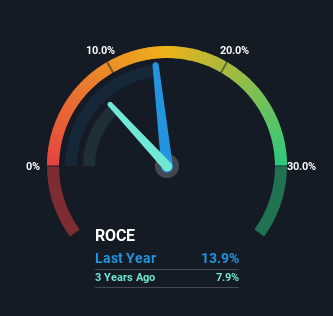The Returns At Takasago Thermal Engineering (TSE:1969) Aren't Growing

To find a multi-bagger stock, what are the underlying trends we should look for in a business? Typically, we'll want to notice a trend of growing return on capital employed (ROCE) and alongside that, an expanding base of capital employed. This shows us that it's a compounding machine, able to continually reinvest its earnings back into the business and generate higher returns. So, when we ran our eye over Takasago Thermal Engineering's (TSE:1969) trend of ROCE, we liked what we saw.
Understanding Return On Capital Employed (ROCE)
Just to clarify if you're unsure, ROCE is a metric for evaluating how much pre-tax income (in percentage terms) a company earns on the capital invested in its business. To calculate this metric for Takasago Thermal Engineering, this is the formula:
Return on Capital Employed = Earnings Before Interest and Tax (EBIT) ÷ (Total Assets - Current Liabilities)
0.14 = JP¥25b ÷ (JP¥319b - JP¥138b) (Based on the trailing twelve months to December 2023).
So, Takasago Thermal Engineering has an ROCE of 14%. On its own, that's a standard return, however it's much better than the 7.0% generated by the Building industry.
See our latest analysis for Takasago Thermal Engineering

In the above chart we have measured Takasago Thermal Engineering's prior ROCE against its prior performance, but the future is arguably more important. If you'd like to see what analysts are forecasting going forward, you should check out our free analyst report for Takasago Thermal Engineering .
So How Is Takasago Thermal Engineering's ROCE Trending?
The trend of ROCE doesn't stand out much, but returns on a whole are decent. Over the past five years, ROCE has remained relatively flat at around 14% and the business has deployed 33% more capital into its operations. Since 14% is a moderate ROCE though, it's good to see a business can continue to reinvest at these decent rates of return. Stable returns in this ballpark can be unexciting, but if they can be maintained over the long run, they often provide nice rewards to shareholders.
On a separate but related note, it's important to know that Takasago Thermal Engineering has a current liabilities to total assets ratio of 43%, which we'd consider pretty high. This effectively means that suppliers (or short-term creditors) are funding a large portion of the business, so just be aware that this can introduce some elements of risk. Ideally we'd like to see this reduce as that would mean fewer obligations bearing risks.
In Conclusion...
The main thing to remember is that Takasago Thermal Engineering has proven its ability to continually reinvest at respectable rates of return. On top of that, the stock has rewarded shareholders with a remarkable 227% return to those who've held over the last five years. So while investors seem to be recognizing these promising trends, we still believe the stock deserves further research.
Takasago Thermal Engineering could be trading at an attractive price in other respects, so you might find our free intrinsic value estimation for 1969 on our platform quite valuable.
While Takasago Thermal Engineering may not currently earn the highest returns, we've compiled a list of companies that currently earn more than 25% return on equity. Check out this free list here.
Valuation is complex, but we're here to simplify it.
Discover if Takasago Thermal Engineering might be undervalued or overvalued with our detailed analysis, featuring fair value estimates, potential risks, dividends, insider trades, and its financial condition.
Access Free AnalysisHave feedback on this article? Concerned about the content? Get in touch with us directly. Alternatively, email editorial-team (at) simplywallst.com.
This article by Simply Wall St is general in nature. We provide commentary based on historical data and analyst forecasts only using an unbiased methodology and our articles are not intended to be financial advice. It does not constitute a recommendation to buy or sell any stock, and does not take account of your objectives, or your financial situation. We aim to bring you long-term focused analysis driven by fundamental data. Note that our analysis may not factor in the latest price-sensitive company announcements or qualitative material. Simply Wall St has no position in any stocks mentioned.
About TSE:1969
Takasago Thermal Engineering
Designs, constructs, manufactures, sells, and installs heating, ventilation, and air conditioning (HVAC) systems in Japan and internationally.
Flawless balance sheet with solid track record and pays a dividend.
Similar Companies
Market Insights
Community Narratives



